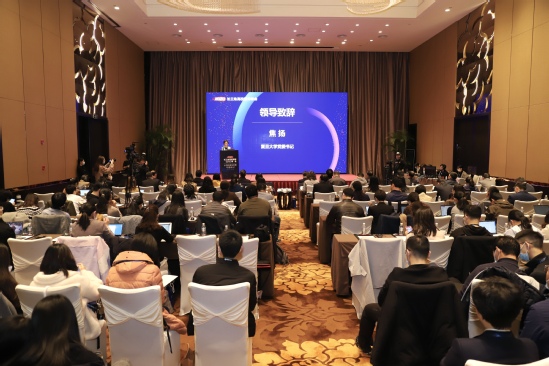Author:Yang Meiping Release date:2020-11-29 22:44:11Source:SHINE

Experts and scholars shared their views on integrated development of the Yangtze River Delta region on Friday at a meeting organized by Fudan University in Qingpu District.
Jiao Yang, Party secretary of the university, delivered the welcoming speech at the opening of the 2020 Yangtze River Delta University Think Tank Summit.
She said the Yangtze River Delta University Think Tank Alliance, established in September last year by Fudan University in Shanghai, Zhejiang University in Zhejiang Province, Nanjing University in Jiangsu Province and the University of Science and Technology of China in Anhui Province, has become a leading model think tank through sharing strength in talent and academics as well as cooperating in research and talent cultivation.
The alliance has produced 15 reports which have received responses from central and regional governments.
“The alliance itself is an innovation fruit of the regional integration and it should focus on the ‘integrated’ and ‘high-quality’ development of the region, which was initiated by Chinese President Xi Jinping,” she said. “Its members should also integrate their strength to provide high-quality consulting services for decision makers as a powerful engine for development of the region.”
She said the alliance should bravely explore new research areas and summarize replicable experiences in the region so they can be promoted in other areas.
She said think tank members should further open research to each other to collect, analyze and utilize big data in the region to serve its development. She also called for more universities to join in the alliance, more frequent talent exchanges and more efforts in jointly cultivating related talent.
Zhang Zhongwei, deputy director of the Demonstration Zone for the Yangtze River Delta Ecological and Integrated Development, said this regional development is a long-lasting sustainable national strategy and will benefit the region continuously.
“The integration breaks the barrier in traditional administrative space division and will improve administration efficiency as well as unlock restrained productivity and market vitality in the region, especially in major industries in the delta, such as port clusters, airport clusters, high-speed train network and ecology of logistics.
“Practices need support and guidance from knowledge and theories. I believe the Yangtze River Delta region will be a hot area for teachers and students to carry out research and practice what they have learned or found.”
Huang Xianhai, vice president of Zhejiang University, pointed out that unilateralism, protectionism and the COVID-19 pandemic have weakened economic globalization and international economic circulation. As a result, China’s dual circulation development strategy, with domestic market circulation as the mainstay, and internal and external circulations reinforcing each other, is a natural choice.
Against such a backdrop, the Yangtze River Delta region should aim to become a center in domestic circulation and a link between the internal and external circulations. He suggested the region should be a consumption center of both domestic products and imported commodities, and an integrator of industrial chains.
Tatsuo Hatta, an honorary professor at Osaka University, shared his knowledge of development in Japan for references to the development of Yangtze River Delta region.